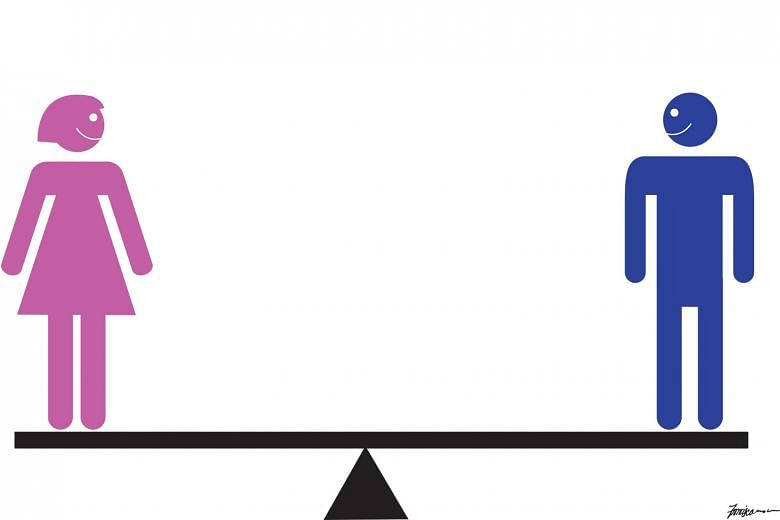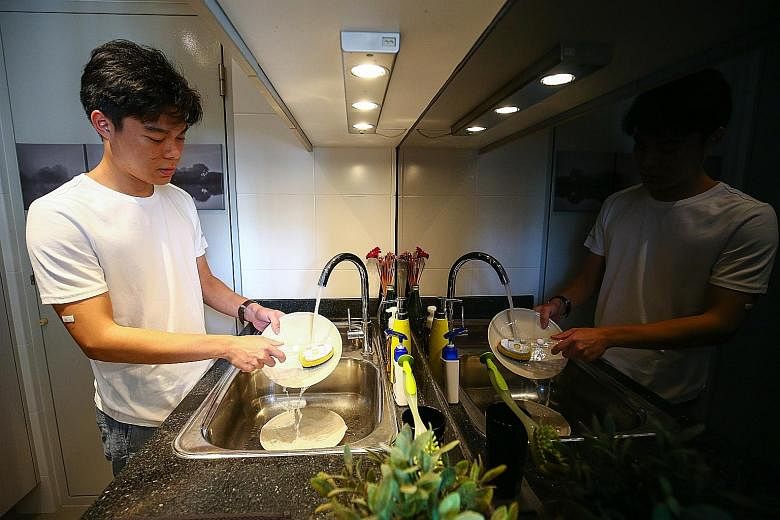Women in Singapore live longer than men, and more make it to university than men. Women have also caught up, though not fully, with men in terms of work and pay.
The World Economic Forum ranked Singapore 54 out of 153 countries on gender equality.
But activists here say that though indicators of equality show that women are doing well, traditional definitions of gender roles perpetuated by patriarchal values still hold women back. Many still play an outsized role at home, and hit glass ceilings at work, or even suffer from sexual violence.
These are the issues that the Government hopes to address in an ongoing review of issues affecting Singapore women.
Announcing the Conversations on Women Development last September, Home Affairs and Law Minister K. Shanmugam spoke about the need to change fundamentally how society views gender equality.
"It must lead us to think, not in terms of accepting differentials, and then seeing what can be done to correct that. We must instead start with accepting equality, and any differential treatment then has to be justified," he had said.
Since then, 37 dialogues have been held involving more than 1,800 participants that included working mothers, young women, housewives, and even men, says the Ministry of Social and Family Development.
This year has also been designated the Year of Celebrating SG Women. The review will culminate in a White Paper in the second half of the year. Issues raised so far include concerns about family violence and hurt and sexual offences against women. A task force on family violence has been set up, co-chaired by Minister of State for Social and Family Development Sun Xueling and Minister of State for Home Affairs Muhammad Faishal Ibrahim. It will make recommendations to address these issues.
Another recurring issue has been the need for society to alter its mindset about traditional gender roles. Insight looks at how these fundamental shifts can be made.
CHANGING THE CONSTITUTION
For some, it has to start with the Constitution. The foundational document embodies the fundamental principles and rights deemed important to society, and already prohibits discrimination based on religion, race, descent or place of birth.
Orthopaedic surgeon and former Nominated MP Kanwaljit Soin, a pioneer in the women's movement, believes it is high time to add gender to the list.
Since Singapore signed on to the United Nations Convention on the Elimination of All Forms of Discrimination Against Women in 1995, women's groups and activists have called for a specific declaration on the equality of men and women.
While the Government's consistent position has been that the principle of equality of all persons before the law, as enshrined in Article 12(1) of the Constitution, is broad enough to cover non-discrimination for both men and women, Mr Shanmugam's call for a more fundamental, philosophical shift in how women's development should be seen has sparked hope among some that gender equality may finally be recognised explicitly in the supreme law of the land.
"Interestingly, if you look at Minister Shanmugam's speech, he himself, being a lawyer, mentioned that equality must be formal and substantive," says Dr Soin.
"I think it can be that only if you put it into the Constitution."
Asked about this in January after a dialogue, Mr Shanmugam had said: "It will have to be considered as part of an inter-ministerial government process, debated, decided upon. And I'll be frank, there are different considerations and trade-offs to be considered."
Around the world, equality, regardless of gender, is enshrined in the Constitutions of 168 countries, from Angola to Germany to Japan.
The UN Women, a UN entity championing gender equality, said in a 2017 policy brief: "Constitutions are the most authoritative expressions of states' systems of governance and accountability and therefore pose potential opportunities for and threats to the advancement of gender equality."
On the significance of recognising such equality in the Constitution, Associate Professor Jaclyn Neo from the National University of Singapore Law School tells Insight: "There is clearly an important symbolic effect. It shows that alongside religion, race, descent or place of birth, gender is also an aspect we take very seriously.".
However, adds the scholar on comparative constitutional law, any change should be approached with circumspection, since such similar moves in other jurisdictions have provided judicially enforced rights and paved the way for lawsuits to be filed.
In Malaysia, for instance, which amended Article 8(2) of its Constitution in 2001, Malaysia Airlines and the government have faced lawsuits on gender discrimination.
Dr Kevin Tan, adjunct professor of law at NUS who specialises in constitutional law, warns that in some countries, such constitutional changes have led to a flood of legal challenges.
Another tricky issue, he says, is that prohibiting gender entirely as grounds for discrimination could lead to a situation where laws aimed at protecting women, such as the Women's Charter and some criminal laws, could fall foul.
He believes that even without an amendment, the Constitution already provides adequate protection under Article 12(1).
"My view is that greater equality between men and women can be better achieved outside of the Constitution. The status of women has risen in Singapore tremendously since the inception of the Women's Charter, which is not a constitutional document," he says.
Dr Soin acknowledges that changing the Constitution will not be the magic bullet to the issues women face. "It will not create a revolution in society's attitudes and behaviour, but I don't see the reason for not putting it into the Constitution when we have said it must be a fundamental value."
ROLE OF MEN
While the review is one on women's development in Singapore, many point out that men play an equally important role in advancing gender equality.
It is not just about them championing women's rights, but also changing their own attitudes about their own roles as husbands, fathers and sons, say advocates.
Achieving gender equality requires that men, too, transform patterns that set women back, such as in caregiving and parenting.
A study by consulting firm McKinsey notes that around the world, women do three times as much unpaid care work as men.
While much has been said about how men should take on a bigger share of the load at home, this can come about only when traditional norms of masculinity change, says Dr Soin. Such norms link having a job and bringing home the bacon with men's sense of purpose, putting pressure on men to do well at work, sometimes at the expense of their other roles, she adds.
This explains why, for instance, a significant number of men do not take up the two weeks of non-transferable paternity leave for fathers.
Official figures show that 53 per cent of men who were eligible for it went on paternity leave in 2019. In 2018, it was 35 per cent, compared with 53 per cent in 2017 and 47 per cent in 2016.
Centre for Fathering chief executive Bryan Tan knows all too well the kind of pressure that traditional gender roles can bring.
In 2014, he hit the lowest point in his life, when he felt like "a hero out there, but a zero at home".
He had always believed being a good husband and father meant doing well at work and providing for his family's material needs.
But the army officer focused so much on work that he drifted apart from his family, and this had him feeling a deep sense of guilt.
He eventually realised, through taking part in programmes run by Dads For Life, that providing for his family should not be so narrowly defined, and that there is no shame in men taking time off work to play a bigger role at home.
Now, at his job and in his daily life, he tries to model this for other men around him. "Whether it is my son, or his friends, or other men, they need to realise that it is an acceptable social norm," he says.
Studies in Europe by the World Health Organisation have found growing evidence that gender norms and stereotypes and notions of masculinity have a big impact on the health of men.
Men living in countries with more gender equality also experience lower mortality rates, higher well-being, and lower rates of suicide and depression.
There is also national service (NS), which some activists feel contribute to maintaining unhealthy gender stereotypes and inequality between men and women.
One way it does so is that men have higher starting salaries than women, with many employers taking into account their two years of military service.
An oft-heard retort by men who believe women already have it good and are asking for too much is that women, too, should serve NS if they want more rights.
Dr Soin, who believes men rightfully should benefit from doing NS, believes that women serving national service will advance gender equality. She notes that many political leaders in Singapore come from the army. "As long as women don't do NS and don't get promoted to brigadier-general and whatever it is, they will not be allowed the same portals into power as the men are," she says.
In recent years, gender equality activists have called for both men and women to do NS, with the Association of Women for Action and Research, for instance, urging the Government to reimagine NS by including community service and not just military training.
Others believe that in the age of modern warfare, which is sometimes waged over the Internet and at other times, uses drones and robotic weapons, women, too, can play a role in the military. But Defence Minister Ng Eng Hen has previously said at a dialogue that women should be conscripted only if there is a demographic reason, not for achieving equity.
Mr Tan, who was in the army for 21 years, believes women are ready to do NS and will happily let his daughter serve. But he adds: "If we take a step back as a nation, can we afford for women to do NS? That's the bigger conversation. Having all males conscripted for two years of NS and thereafter serve up to 10 to 13 years of reservist comes at a huge economic cost for the nation. If we also conscript women, it is going to cost more economically and socially."
Even then, he believes NS can be a place where men learn a healthy sense of masculinity and there is scope to make this one of the aims of two years of full-time service.
He quips that NS was where he learnt how to do household chores.
"In the army, most men clean toilets and make our own beds, do our own laundry and iron our own uniform. So after you leave, why is there a need to stop right?" he says.
-
54
Singapore's position in the World Economic Forum's gender equality ranking of 153 countries.
3x
Amount of unpaid care work women do more than men around the world, according to a study by consulting firm McKinsey.
53%
Proportion of men eligible for paternity leave who took it in 2019.



